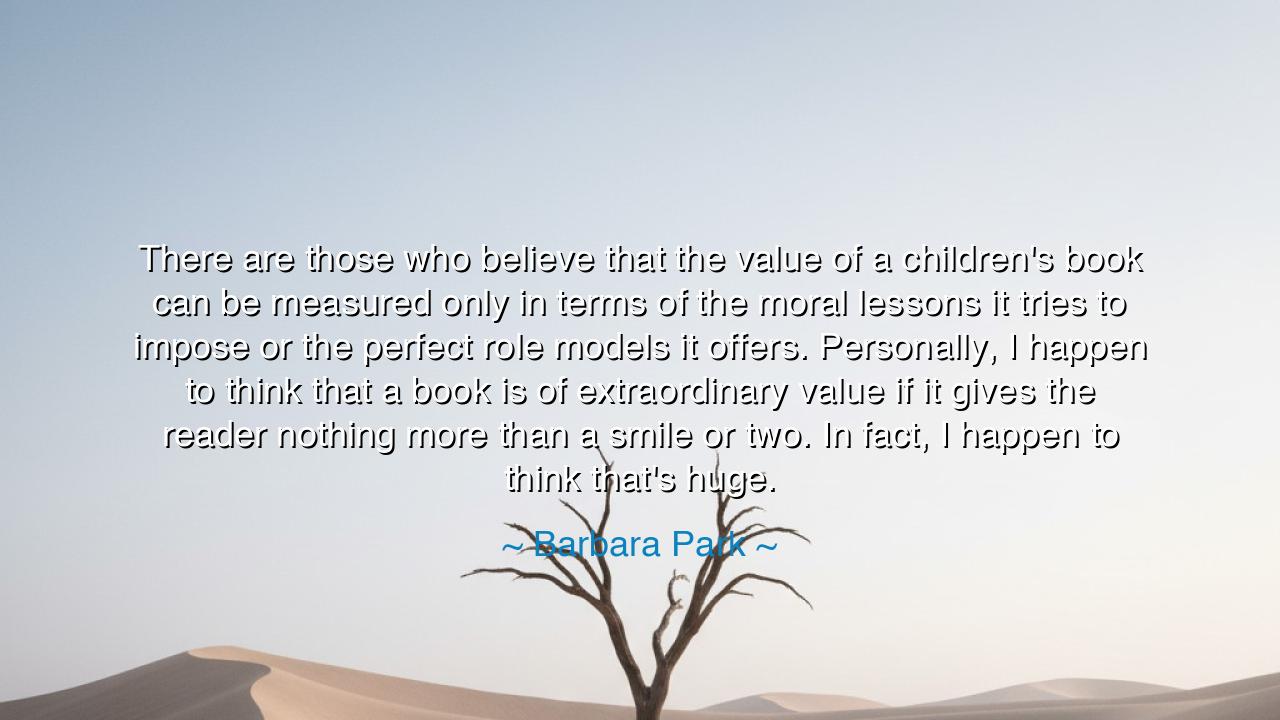
There are those who believe that the value of a children's book
There are those who believe that the value of a children's book can be measured only in terms of the moral lessons it tries to impose or the perfect role models it offers. Personally, I happen to think that a book is of extraordinary value if it gives the reader nothing more than a smile or two. In fact, I happen to think that's huge.






The words of Barbara Park ring with a wisdom both tender and defiant: “There are those who believe that the value of a children’s book can be measured only in terms of the moral lessons it tries to impose or the perfect role models it offers. Personally, I happen to think that a book is of extraordinary value if it gives the reader nothing more than a smile or two. In fact, I happen to think that's huge.” At first, they may appear lighthearted, but within them lies an ancient truth: joy itself is a form of teaching, and laughter is often more powerful than sermons.
The meaning here rests upon the nature of childhood. Childhood is not merely preparation for life—it is life itself, rich with wonder and discovery. Too often adults treat it as a place to inscribe lessons, to mold with sternness, to measure by utility. Yet Park reminds us that the greatest gift a book can give a child is not always instruction, but smiles, those sparks of delight that kindle imagination and soften the heart. A single moment of laughter can be the seed of courage, resilience, and hope.
The ancients knew this truth, though they cloaked it in myth and parable. Consider Aesop’s fables: they were not dry lectures of morality, but tales of talking animals, wit, and humor. Children laughed at the sly fox or the foolish crow, and in their laughter, they absorbed wisdom effortlessly. The lesson was not imposed like a weight, but carried lightly on the wings of story. In this way, Barbara Park stands in the line of storytellers who knew that joy is the most enduring teacher.
There is also here a challenge to the solemnity of the world. Many adults believe that only heavy matters are valuable, that books must preach and children must learn stern truths early. But Park declares otherwise: that to make a child laugh is no small thing, but a huge thing. For the smile of a child is not frivolity—it is medicine, it is light in a world where burdens will come soon enough. If childhood is robbed of laughter, the spirit grows weary before its time.
History offers us proof. In the darkest years of the Second World War, Anne Frank, hiding in her attic, treasured not only the serious reflections she recorded but also the small jokes and playful stories she exchanged with her companions. Even in suffering, it was humor and laughter that preserved her humanity. If a smile could be life-saving in such a time, how much more sacred is the gift of joy in ordinary childhood? Park’s vision of books that bring smiles honors this truth: joy is a shield for the soul.
The origin of her words is her own craft as a writer of children’s books. Barbara Park, through her beloved Junie B. Jones series, brought giggles and delight to millions of children. Critics may have wished for tidy morals, but Park gave something far more essential: the freedom for a child to laugh at mischief, at mistakes, at the oddities of life. In those smiles, children found not only entertainment, but a reflection of themselves, imperfect yet loved.
The lesson for us is clear: do not underestimate the power of joy. A smile, a moment of laughter, a lighthearted story—these are not lesser gifts, but treasures that fortify the heart. In practice, this means we must allow children space to play, to laugh, to read stories that delight rather than always instruct. And for ourselves, we must remember that joy is not trivial, but sacred. To share laughter is to share life’s sweetness.
So let this wisdom be carried forward: the measure of a book, of a life, of a day, is not always in the weight of its lessons, but often in the smiles it leaves behind. Do not scorn joy, for it is itself a great virtue. Let your words, your deeds, your stories bring laughter to the hearts of others. For in those moments of light, we glimpse eternity’s gentlest truth—that to smile is to live fully, and to make others smile is to live nobly.






AAdministratorAdministrator
Welcome, honored guests. Please leave a comment, we will respond soon